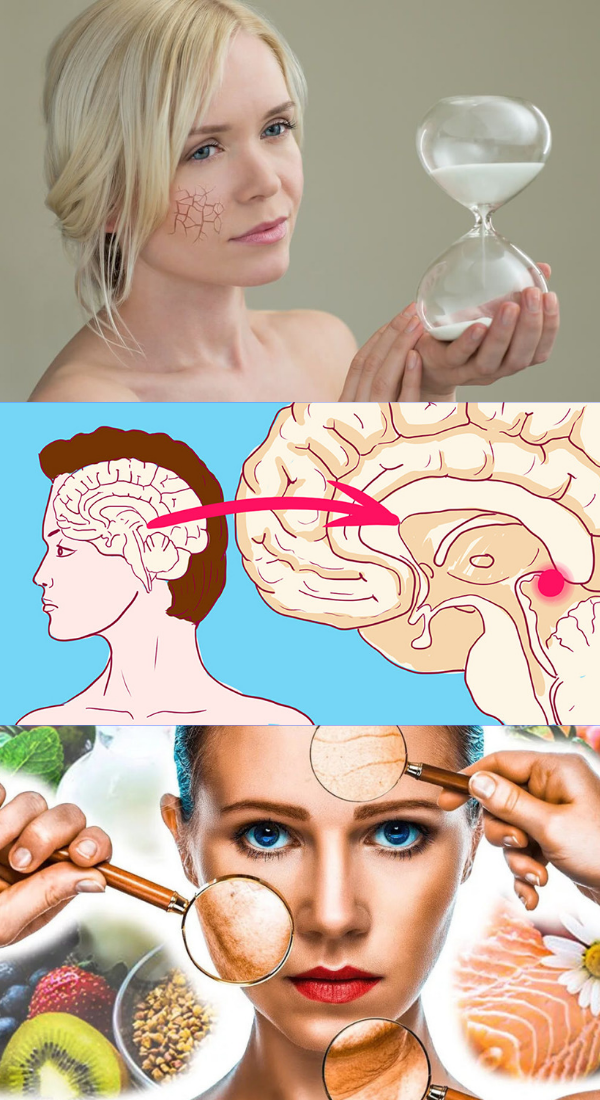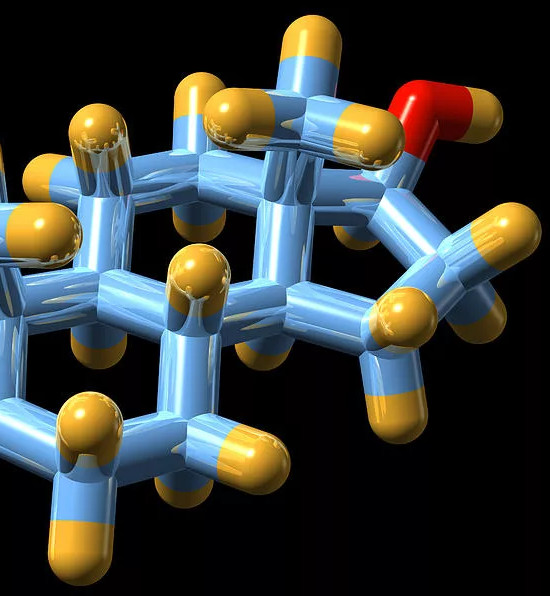"It's never too late to start getting younger" Mae West. Since ancient times, it has been known that hormone levels decrease with age. The inhabitants of ancient Greece , Egypt and India tried to restore their declining sexuality and increase their energy potential by taking extracts from the male gonads of animals.
Today we already know that the decline in hormone levels is due to the development of diseases that accompany the aging process , such as cardiovascular disease , osteoporosis and cancer.
Some hormonal fluctuations are associated with other age-related changes , such as muscle loss , obesity, and mental disorders. Most of these undesirable changes now occur not only due to a decrease in the absolute level of hormones , but also due to a shift in the balance between various hormones.
All hormones in our body can be divided into two groups: anabolic and catabolic.

Anabolic hormones contribute to the growth and formation of tissues - for example , they are responsible for powerful muscles and strong bones. You may have heard of anabolic steroids , synthetic chemicals used to develop powerful muscles ( and banned from use in preparation for the Olympics). But sex hormones , growth hormones and DEA ( dehydroepiandrosterone) are natural anabolic hormones - steroids , the level of which almost always begins to fall after reproductive age.
Catabolic hormones , on the other hand , cause tissue destruction. The main catabolic hormone is cortisol , a stress hormone produced by the adrenal glands. Insulin ( produced by the pancreas) and estrogen ( in men) act as catabolic hormones to some extent. Unlike anabolic hormones , cortisol and insulin levels ( in both sexes) and estrogen levels ( in men) do not typically decrease with age; in rare cases, the level may decrease slightly , or remain at the same level, or in some cases , as is the case with estrogen in men , on the contrary , it rises. This leads to hormonal imbalance , which plays an important role in the aging process.
Insulin is produced in the pancreas in response to high blood sugar. Be aware that insulin does not always act as a catabolic hormone. In small amounts, it works as an anabolic hormone and promotes tissue growth.
See also: Hormonal gymnastics: improves appearance and heals ...
In large quantities , when too many sugary foods or foods with a high glycemic load are consumed , it stimulates the growth of only one type of tissue - adipose tissue , or simply fat. With age, the susceptibility of cells to insulin decreases , and its level increases. This is the main reason for gaining excess weight in the aging process. With age, the balance between hormones shifts from anabolic to catabolic.
Anabolic hormones - testosterone , estrogen in women , progesterone , growth hormone , melatonin and DEA - promote tissue growth and youth maintenance , therefore they are referred to as hormones of youth. Conversely , cortisol , insulin and estrogen ( in men) are classified as aging hormones.
Aging hormones
What steps can we take now to maintain a more youthful balance between the two types of hormones? We suggest you start by discussing ways to reduce or even reverse the gradual prevalence of catabolic hormones.
Cortisol
The body's response to stress is a rapid release of cortisol from the adrenal glands , which makes the cardiovascular system and lungs work hard , suppressing the immune system , slowing down digestion and reducing reproductive function.
A strong spike in cortisol increases your heart rate , allowing you to run faster , dilates your pupils , allowing you to see better , and raises your blood sugar , improving mental performance. But the constant release of excess cortisol accelerates the aging process , promotes disease , destroys muscle tissue ( sarcopenia) and bones ( osteoporosis), causes sodium retention in the body and high blood pressure , increases blood sugar and destroys the immune system.
Patients with Cushing's disease ( associated with an excess of cortisol) or patients who have taken synthetic forms of cortisol for a long time develop significant loss of muscle mass and bone weakness. In Dune, by Frank Herbert, it says "Fear destroys the brain."
Indeed , fear raises cortisol levels , which studies have shown lead to impaired brain activity . For example , Dr. D.S. Halsa demonstrated with the help of his Alzheimer's patients how chronic stress destroys memory.
As you can see in the picture below , all steroid hormones ( including cortisol) are synthesized from cholesterol. Cholesterol is first converted to pregnenolone , which can then be converted to either progesterone or DEA , the "mother hormones" of testosterone and estrogen. When stress is chronic or excessive , more cortisol is produced at the expense of DEA , testosterone, and estrogen. The normal aging process is associated with a slight shift towards more cortisol production and a simultaneous decrease in the production of other hormones.
Also Read: 6 Stretching Exercises To Get Rid Of Back And Hip Pain Forever...
The easiest way to determine how well your youth hormones fight aging hormones is to determine the ratio of DEA ( anabolic hormone of youth) and cortisol ( catabolic aging hormone). You can find out by taking adrenal stress test , which will also test the health of the adrenal glands themselves.
You can get a test kit from a GP or medical practitioner without having to donate blood. You do the analysis at home , collecting saliva samples 4 times a day - upon waking up , at lunch , dinner and before going to bed.
A normal result is one with higher cortisol levels in the morning and a gradual decrease throughout the day. Under the influence of chronic stress, this daily variation is often imperceptible, and as a result, we get a practically straight line instead of a downward one.
In adrenal stress tests, the ratio of DEA to cortisol is also calculated. In young people, this ratio is usually high , but in older people it is already decreasing.
the relationship include supplementing with DEA , eating herbs such as natural Chinese herbal liquorice or the Ayurvedic herb ashwagandha , and following a cortisol-lowering lifestyle and a low glycemic load diet . , stress reduction , regular exercise and a healthy amount of sleep.
Insulin
If there was a race between insulin and cortisol to see who would destroy the body faster , we would bet on insulin . Barry Sears in The Rejuvenation Zone calls an excess of insulin "a ticket to accelerated aging."
Excess insulin increases body fat , increases cortisol levels and causes insulin resistance , accelerates the development of atherosclerosis and increases the risk of heart disease , and interferes with other hormones of youth.
Insulin is produced when there are excess calories. When you eat sugar or foods with a high glycemic load , you are so stimulating the production of excess insulin that your body can separate the sticky sugar from your blood. As soon as insulin levels rise , blood glucose instantly turns into fat , which is then deposited in the body's fat cells.
Cortisol and insulin are the same "good old boys" of the Hormone Country Club . Excess insulin increases cortisol levels , and excess leads to an increase in insulin levels. Excess insulin is also an independent risk factor for coronary heart disease.
Insulin reduces the effectiveness of youth hormones , which accelerates the aging process.
It is for this reason that in sugar or foods with a high glycemic load that raise insulin levels cause us to age much faster than anything else in our diet. It's easy to get caught up in a lifestyle that promotes insulin overload: lack of exercise , constant low stress, and high glycemic carbohydrates.
See also: 7 professions that you can learn from scratch after 35 years ...
Knowledge about nematodes
C. elegans is a type of roundworm that scientists often use in their experiments. Nematodes gained their fame by being the first metazoans whose genetic map was fully reproduced in 1999. In 2003, c.elegans again came under the spotlight , having lived 188 days , which is equivalent to 500 years in human terms.
In earlier experiments, lifespan has reached 150 days by manipulating the genome of roundworms coded for IGF-1 , a protein that is very close to human growth hormone. But there was one problem: while the worms gained longevity , they showed reduced activity throughout their lives.
In further research, Cynthia Kenton of the University of California , San Francisco , added insulin manipulation and removed some of the gonadal tissue. As a result, the worms gained even greater longevity without a decrease in activity. Since in humans and c. elegans most of the genes are the same , this research could lead to methods to extend human life by manipulating the levels of insulin and some other hormones without removing any organ tissue.
Youth hormones
A decrease in the level of catabolic hormones helps to equalize their ratio to the anabolic hormones of youth. But historically, the most acceptable way to balance the balance has been direct hormone replacement. Typically, the term "hormone replacement therapy" ( HRT) refers to the sex hormones estrogen , progesterone, and testosterone. Next, we will discuss no less important hormones of youth: DEA , growth hormone and melatonin.
DEA
DEA , or dehydroepiandrosterone, is the most common steroid hormone that is produced in our body. In the past , DEA was thought to be just a precursor to other hormones and had no special physiological properties.
But later, William Regelson , a well-known medical research practitioner , called DEA "the superstar among superhormones." The level of DEA reaches its peak at 25 years of age , then gradually decreases by 50% by the age of 40 , and by the age of 85 it is approximately 5% of its level in youth.
Does this mean that DEA could help prolong life? According to animal experiments, DEA supplements can slow down the aging process and increase life expectancy.
It has been proven that men with higher levels of DEA are less susceptible to the development of cardiovascular diseases. DEA has anti-inflammatory properties and is able to reduce the level of IL-6 ( interleukin-6) and TNF-α ( tumor necrosis factor alpha), which are strong causative agents of dangerous inflammation in the body. 's oncology research , DEA prevents uncontrolled cell division , a clear sign of cancer cells .
Useful properties of DEA:
- Reduces the risk of developing cardiovascular disease
- Fights stress
- Improves the functioning of the immune system
- Relieves depression
- Improves memory
- Alleviates menopausal symptoms
- Prevents bone weakness
- Strengthens libido
- Increases insulin sensitivity and glucose tolerance
- Increases lean body mass
DEA "tames" cortisol. When you are stressed , your body produces an excessive amount of insulin , which negatively affects the functioning of your immune system , which in turn leads to a predisposition to diseases and accelerates the aging process.
Several studies have identified a link between a suppressed immune system and an imbalance between DEA and cortisol. By supplementing with DEA , you will improve the immune system that is suppressed by cortisol and other steroids. Since DEA is a precursor to testosterone , it may have a positive effect on libido , especially in women. DEA also promotes the transformation of food into energy and burns excess weight.
Before you start taking DEA-S ( DEA sulfate) supplements, check your DEA levels , and then check it every six to eight weeks to make sure you are close to your desired result. It is recommended to stick to the level of 300 for men and 250 for women. Men should start with 15-25 milligrams of DEA per day , and women with 5-10 milligrams , then increase the dose to reach the desired level.
Caution: Since DEA is a male-dominated hormone , it can easily be converted to testosterone. DEA supplementation also raises PSA ( prostate specific antigen), an important marker for prostate cancer. Before , men should check their SAP levels and also during the intake every 6-12 months. If the level of SAP increases , then you should immediately stop taking DEA and consult a doctor.
See also: of Vaselinethat many do not know about ...
Human Growth Hormone
The hype around the role of growth hormone ( GH) in the fight against aging flared up in the 1990s , thanks to the publication of Daniel Rudman , a researcher at the Medical College of Wisconsin.
He published the results of a placebo-controlled study in which 21 men aged 61 to 81 took part. Among all the positive effects of growth hormone, he found the following: an increase in muscle mass , a decrease in adipose tissue , an improvement in bone health , an improvement in cholesterol levels, and a more responsive response to insulin.
Numerous similar studies have come to the same results. In the online search engines of the National Library of Medicine, 48,000 articles come up for the query "growth hormone". It should be noted that it is highly unlikely that growth hormone therapy will help gain muscle mass and get rid of fat without diet and exercise.
GH has a positive effect on the functioning of the cardiovascular system , lipid metabolism and blood pressure. In patients treated with GH for 7 years , the decline in insulin sensitivity that occurs with aging has been reversed.
GH injections were previously used to treat children who were found to be deficient. But adult growth hormone deficiency , now called adult growth hormone deficiency ( AGD), is recognized as a distinct syndrome for which GH has been approved by the FDA for treatment.
 Although the positive effects of GH therapy are clear , some dark sides should be noted. This is an expensive treatment , ranging from $2,000 to $8,000 a year , depending on the dose needed, and is not always covered by insurance. The treatment requires daily injections and their benefits for healthy people are quite controversial.
Although the positive effects of GH therapy are clear , some dark sides should be noted. This is an expensive treatment , ranging from $2,000 to $8,000 a year , depending on the dose needed, and is not always covered by insurance. The treatment requires daily injections and their benefits for healthy people are quite controversial.
In 2002, the National Institutes of Health sponsored a study that followed 121 people after receiving GH injections with or without synthetic hormone replacement therapy in 1992 and 1998.
The results of Rudman's report on gaining muscle mass and losing adipose tissue were confirmed , but the following side effects were also identified: 24% of men developed glucose intolerance or diabetes , 32% - carpal tunnel syndrome , 41% - aching joints. 39% percent of women developed dropsy. The authors of the study concluded that "due to the frequent occurrence of side effects ( especially diabetes and glucose intolerance), the use of GH therapy in adults should be limited to the scope of the studies."
There is currently a debate about the likelihood of an increased risk of developing cancer after undergoing therapy. G. R. No Shim and Koen from the University of California at Los Angeles stated: “The risk of developing cancer does not increase significantly beyond the usual rates in the population,” in addition to which other studies also did not confirm an increase in rates of rectal or prostate cancer.
Since GH therapy in the fight against aging is not so long ago , we must not forget about the possible side effects. It is important to understand that long-term studies on the safety of GH injections in healthy adults are yet to come. Fortunately , it is in our power to change our habitual lifestyle in such a way as to achieve the results of an injection of GH without resorting to the injections themselves.
Sugar and high glycemic carbohydrates reduce the production of GH in the pituitary gland , and a protein diet , on the contrary , promotes its production. Eating a low sugar, low glycemic load diet will increase your GH levels in your body.
Deep sleep and anaerobic exercise are the two main factors in stimulating GH production in healthy individuals. Adults who to exercise throughout their lives maintain muscle mass and higher levels of GH.
Consumption of certain amino acids , such as arginine , ornithine , glycine, and glutamine , stimulates the pituitary gland to release more GH. Supplements with varying amounts of these amino acids and are also called secretagogues , as they encourage the pituitary gland to release GH from its reserves.
Supplementation containing DEA is an inexpensive way to increase GH levels.
For most people who would like to experience the effectiveness of the anti-aging effect of growth hormone , it is recommended to follow the recommendations listed above. Until further research results are known , we advise that GH injections be limited to adults with a diagnosis of GAD based on the judgment of an experienced physician.
Before taking any of the above measures, check the level of IGF-1 ( insulin-like growth factor-1) in the blood. IGF-1 is more accurate than GH levels because IGF-1 gives an average of GH levels that constantly fluctuate in the bloodstream. Based on your age and gender , your healthcare provider will be able to determine the best level for you.
Our vestigial organs
Once technologies are invented that will maintain nutrients and other substances in the blood at the required level, we will not need organs that are responsible for the production of chemicals , hormones and enzymes. In the human body version 2.0 , hormones and related substances will be delivered by nanorobots , and a biofeedback system will control the production of substances and maintain the necessary balance between them.
Eventually , it will be possible to avoid the presence of most of our biological organs. This reshaping process cannot be completed in one go. Each body and each idea requires its own development , semi-finished project and implementation steps. Nevertheless , we are aimed at fundamental and radical changes in the absolutely imperfect , unreliable and functionally limited human body version 1.0.
Melatonin
According to some reports , at least 50% of all Americans over the age of 65 suffer from sleep disorders , although sleep plays an important role in the health of the body. Long-term sleep disturbances lead to depression and suppression of the immune system.
Melatonin is a light-sensitive hormone that is produced rhythmically in the human pineal gland , located deep in the brain. The daily rhythm of a person is controlled by the internal biological clock. During the day, melatonin levels decrease and rise in the evening before going to bed.
Melatonin levels peak around midnight , stay for a while, and then begin to decline. The production of melatonin depends on the daily cycle. The duration of melatonin production depends on the duration of darkness , thus , it turns out that the greatest amount of melatonin is produced in winter than in summer.
The peak production of melatonin is reached by the age of seven. It then declines sharply by adolescence. By the age of 45, the pineal gland begins to shrink and loses melatonin-producing cells.
The hormone begins to be produced randomly. By age 60, only 50% of the amount of melatonin produced at the time of your twenties is produced , which explains why many older people have trouble sleeping. Recent studies of double anonymity with a placebo control group have shown that melatonin supplements help solve sleep problems in people over 55 years of age.
Melatonin is a strong antioxidant and is highly valued in the fight against certain types of cancer , such as breast cancer.
See also: All diseases are from acids! Here are 10 ways to restore balance...
With insufficient levels of melatonin, the following vicious cycle occurs:
- The body loses its ability to produce more melatonin and begins to age faster.
- As we age, melatonin production decreases further.
- Decreased melatonin levels signal to other glands and organ systems that it's time for a well-deserved rest. In women, the ovaries cease to function , estrogen levels fall , and menopause syndrome sets in. In men , despite the fact that sperm continues to be produced , testosterone decreases.
- In both sexes, the immune system weakens , exposing us to various diseases ranging from infections to cancer and autoimmune diseases ( a condition where the immune system rebels against the body's own tissues).
- This is followed by disturbances in the functioning of organ systems , which increases the speed along the slope.
You can slow down this downward spiral of events by taking small doses of melatonin daily. Since some people develop resistance to melatonin , you should start taking it 4-5 nights a week ( although some take it every day without experiencing any problems).
Melatonin is an inexpensive and widely available over-the-counter supplement , but it can have a profound effect on our bodies. We advise you to use small doses if you decide to make melatonin supplements part of your anti-aging program.
For most healthy people who are not bothered by sleep problems , it is recommended to take 0.1 milligram of melatonin half an hour before going to bed. You can increase the dose to 0.5-1.0 milligrams , which is usually not needed for people without sleep problems.
If you constantly experience difficulty falling asleep , you are advised to take melatonin sublingually for rapid absorption. Start with 3-5 milligrams and increase to 10 milligrams as needed. It has been experimentally proven that an increase in melatonin above the specified norm does not lead to any results. If melatonin supplements do not help you , you should consult with your healthcare provider.
If you wake up frequently during the night , try to time your melatonin production. Please note that this will make you feel tired in the morning. If you find it difficult to fall asleep or wake up frequently during the night , try combining products that have both a fast-acting and slow-release formula.
In order not to experience problems when changing time zones ( jet lag), you should take 3 milligrams of melatonin when going to bed in a new place for the first three days. You will have to experiment a bit to find the best melatonin dose for you.
The materials are for informational purposes only. Remember , self-medication is life-threatening , consult a doctor for advice on the use of any medications and treatments.
Save so you don't lose

See also: From 12 stretching exercisesso that muscle pain is gone forever ...